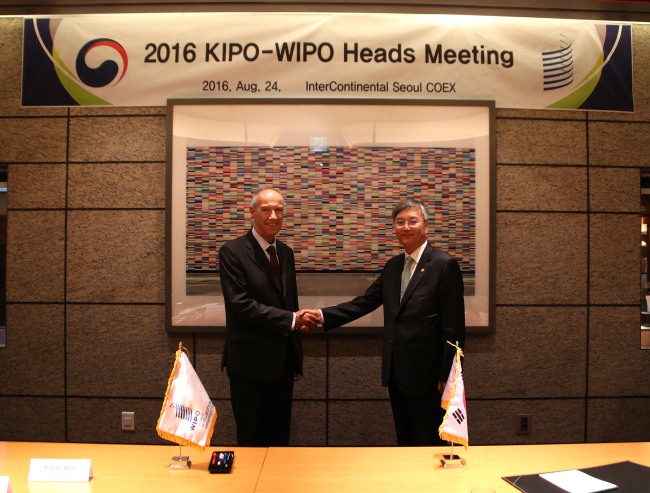AI, big data to impact intellectual property globally: KIPO chief
By Korea HeraldPublished : Oct. 20, 2016 - 16:17
The advancement of artificial intelligence and big data will have a big impact on the global community of intellectual property, chief of Korea’s state-run patent office said.
Choi Dong-gyou, commissioner of the Korea Intellectual Property Office, said he shared his views at the recent global conference of the World Intellectual Property Office held in Geneva, Switzerland, on Oct. 3-11.
Choi Dong-gyou, commissioner of the Korea Intellectual Property Office, said he shared his views at the recent global conference of the World Intellectual Property Office held in Geneva, Switzerland, on Oct. 3-11.

The advancement of artificial intelligence and big data will have a big impact on the global community of intellectual property, chief of Korea’s state-run patent office said.
Choi Dong-gyou, commissioner of the Korea Intellectual Property Office, said he shared his views at the recent global conference of the World Intellectual Property Office held in Geneva, Switzerland, on Oct. 3-11.
“I delivered an opening statement stressing how the fourth industrial revolution, based on artificial intelligence and big data, will affect the development of the IP system,” Choi said in an interview with The Korea Herald.
“I also introduced Korea’s recent policies including revisions to the Patent Act, aimed at ensuring efficient granting of patents and preventing substandard patents.”
At the 56th general assembly of WIPO, a UN-affiliated inter-governmental organization, heads of patent offices from 189 countries discussed how to improve the global IP system.
KIPO’s participation in the WIPO conference helped enhance Korea’s position as the fourth largest producer of intellectual property rights and contribute to setting global standards in intellectual property, Choi said.
“While contributing to setting global standards in intellectual property, I will do my best to help Korean companies make technological innovations and enhance competitiveness,” he said.
Especially in China, KIPO will closely cooperate with the China Trademark Office to protect Korean brand rights and strengthen promotions to broaden people’s understanding of intellectual property rights, he said.
Another challenge facing the global patent industry is narrowing the divide in intellectual property knowledge between developed and developing countries, Choi said.
To bridge the gap, the Korean government is utilizing “Korea Funds-in-Trust” for intellectual property rights in collaboration with WIPO, he said. Through the trust fund, KIPO is running 113 patent knowledge sharing projects in 50 developing countries.
KIPO’s introduction of its patent knowledge sharing programs to help enhance the lives of people in developing countries also drew keen attention from the international intellectual property community at a recent Seoul event, Choi noted.
World Intellectual Property Office Director General Francis Gurry and another 100 officials attended the Global IP-Sharing Korea event held in Seoul on Aug. 24.
“One good example was Mongolia where we developed a machine that can simultaneously extract natural dying materials and dye clothes in December last year. We provided two machines to a fabric research center and a wool cooperative association there,” Choi said.
In Myanmar, KIPO helped develop a brand called “Diamond Mango” in 2014 and a waste water treatment system in 2015 to solve flooding problems at a high school.
By Kim Yoon-mi(yoonmi@heraldcorp.com) and Lee Kwon-hyoung
-
Articles by Korea Herald










![[Today’s K-pop] BTS pop-up event to come to Seoul](http://res.heraldm.com/phpwas/restmb_idxmake.php?idx=644&simg=/content/image/2024/04/17/20240417050734_0.jpg&u=)
![[Graphic News] More Koreans say they plan long-distance trips this year](http://res.heraldm.com/phpwas/restmb_idxmake.php?idx=644&simg=/content/image/2024/04/17/20240417050828_0.gif&u=)





![[KH Explains] Hyundai's full hybrid edge to pay off amid slow transition to pure EVs](http://res.heraldm.com/phpwas/restmb_idxmake.php?idx=652&simg=/content/image/2024/04/18/20240418050645_0.jpg&u=20240419100350)

